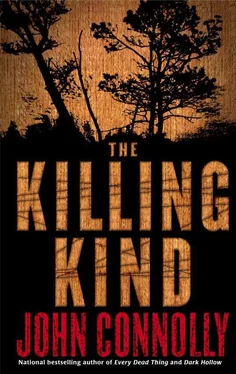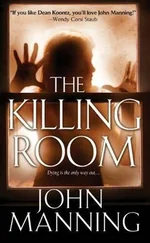Mercier's home was a huge white place with landscaped gardens and so many rooms that a search party would have to be organized if anybody got lost on the way to the bathroom. The man with the mustache parked the Mercedes while I followed Harrold through the large double front doors, down the hallway, and into a room to the left of the main stairs. It was a library, furnished with antique couches and chairs. Books stretched to the ceiling on three walls; on the east-facing wall, a window looked out on the grounds and the sea beyond, a desk and chair beside it and a small bar to the right.
Harrold closed the door behind me and left me to examine the spines on the books and the photographs on the wall. The books ranged from political biographies to historical works, mainly examinations of the Civil War, Korea, and Vietnam. There was no fiction. In one corner was a small locked cabinet with a glass front. The books it contained were different from those on the open shelves. They had titles like Myth and History in the Book of Revelation; Apocalypse and Millennium in English Romantic Poetry; The Book of Revelation: Apocalypse and Empire; and The Apocalyptic Sublime. It was cheerful stuff: bedtime reading for the end of the world. There were also critical biographies of the artists William Blake, Albrecht Dürer, Lucas Cranach the Elder, and Jean Duvet, in addition to facsimile editions of what appeared to be medieval texts. Finally, on the top shelf were twelve almost identical slim volumes, each bound in black leather with six gold bands inset on the spine in three equidistant sets of two. At the base of each spine was the last letter of the Greek alphabet: Ω, for omega. There was no key in the lock, and the doors stayed closed when I gave them an experimental tug.
I turned my attention to the photographs on the walls. There were pictures of Jack Mercier with various Kennedys, Clintons, and even a superannuated Jimmy Carter. Others showed Mercier in an assortment of athletic poses from his youth: winning races, pretending to toss footballs, and being carried aloft on the shoulders of his adoring teammates. There were also testimonials from grateful universities, framed awards from charitable organizations headed by movie stars, and even some medals presented by poor but proud nations. It was like an underachiever's worst nightmare.
One more recent photograph caught my eye. It showed Mercier sitting at a table, flanked on one side by a woman in her sixties wearing a smartly tailored black jacket and a string of pearls around her neck. To Mercier's right was the bearded man who had passed me in the Mercedes, and beside him was a figure I recognized from his appearances on prime-time news shows, usually looking triumphant at the top of some courthouse steps: Warren Ober, of Ober, Thayer amp; Moss, one of New England's top law firms. Ober was Mercier's attorney, and even the mention of his name was enough to send most opposition running for the hills. When Ober, Thayer amp; Moss took a case, they brought so many lawyers with them to court that there was barely enough room for the jury. Even judges got nervous around them.
Looking at the photograph, it struck me that nobody in it seemed particularly happy. There was an air of tension about the poses, a sense that some darker business was being conducted and the photographer was an unnecessary distraction. There were thick files on the table before them, and white coffee cups lay discarded like yesterday's roses.
Behind me the door opened and Jack Mercier entered, laying aside on the table a sheaf of papers speckled with bar charts and figures. He was tall, six-two or six-three, with shoulders that spoke of his athletic past and an expensive gold Rolex that indicated his present status as a very wealthy man. His hair was white and thick, swept back from a perma-tanned forehead over large blue eyes, a Roman nose, and a thin, smiling mouth, the teeth white and even. I guessed that he was sixty-five by now, maybe a little older. He wore a blue polo shirt, tan chinos, and brown Sebagos. There was white hair on his arms, and tufts of it peeked out over the collar of his shirt. For a moment the smile on his face faltered as he saw my attention focused on the photograph, but it quickly brightened again as I moved away from it. Meanwhile, Harrold stood at the door like a nervous matchmaker.
“Mr. Parker,” said Mercier, shaking my hand with enough force to dislodge my fillings. “I appreciate you taking the time to see me.” He waved me to a chair. From the hallway, an olive-skinned man in a white tunic appeared with a silver tray and set it down. Two china cups, a silver coffeepot, and a matching silver creamer and sugar bowl jangled softly as the tray hit the table. The tray looked heavy, and the servant seemed kind of relieved to be rid of it.
“Thank you,” said Mercier. We watched as he left, Harrold behind him. Harrold gently closed the door, giving me one last pained look before he departed, then Mercier and I were alone.
“I know a lot about you, Mr. Parker,” he began as he poured the coffee and offered me cream and sugar. He had an easy, unaffected manner, designed to put even the most fleeting of acquaintances at ease. It was so unaffected that he must have spent years perfecting it.
“Likewise,” I replied.
He frowned good-naturedly. “I don't imagine you're old enough to have ever voted for me.”
“No, you retired before it became an issue.”
“Did your grandfather vote for me?”
My grandfather, Bob Warren, had been a Cumberland County sheriff's deputy and had lived in Scarborough all his life. My mother and I had come to stay with him after my father died. In the end, he outlived his own wife and daughter, and I had buried him one autumn day after his great heart failed him at last.
“I don't believe he ever voted for anyone, Mr. Mercier,” I said. “My grandfather had a natural distrust of politicians.” The only politician for whom my grandfather ever had any regard was President Zachary Taylor, who never voted in an election and didn't even vote for himself.
Jack Mercier grinned his big white grin again. “He might have been right. Most of them have sold their souls ten times over before they're even elected. Once it's sold, you can never buy it back. You just have to hope that you got the best price for it.”
“And are you in the business of buying souls, Mr. Mercier, or selling them?”
The grin stayed fixed, but the eyes narrowed. “I take care of my own soul, Mr. Parker, and let other people do as they wish with theirs.”
Our special moment was broken by the entrance of a woman into the room. She wore a deceptively casual outfit of black pants and a black cashmere sweater, and a thin gold necklace gleamed dully against the dark wool. She was about forty-five, give or take a year. Her hair was blond, fading to gray in places, and there was a hardness to her features that made her seem less beautiful than she probably thought she was.
This was Mercier's wife, Deborah, who had some kind of permanent residency in the local society pages. She was a Southern belle, from what I could recall, a graduate of the Madeira School for Girls in Virginia. The Madeira's principal claim to fame, apart from producing eligible young women who always used the correct knife and never spat on the sidewalk, was that its former headmistress, Jean Harris, had shot dead her lover, Dr. Herman Tarnower, in 1980, after he left her for a younger woman. Dr. Tarnower was best known as the author of The Scarsdale Diet, so his death seemed to provide conclusive evidence that diets could be bad for your health. Jack Mercier had met his future wife at the Swan Ball in Nashville, the most lavish social occasion in the South, and had introduced himself to her by buying her a '55 Coupe de Ville with his AmEx card at the postdinner auction. It was, as someone later commented, love at first swipe.
Читать дальше












